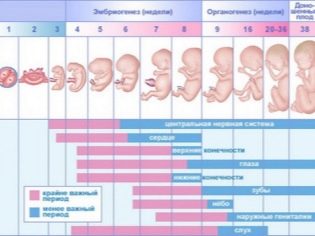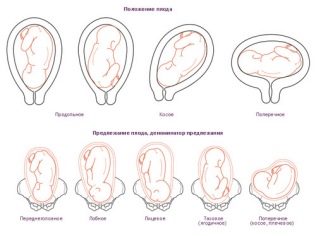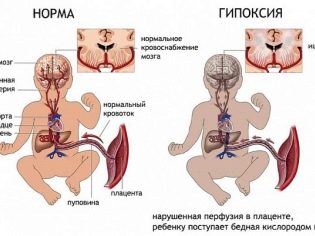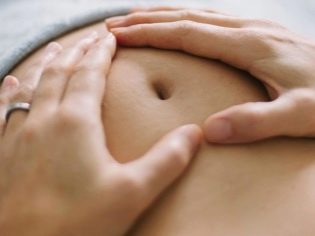How long does a pregnant woman usually begin to feel fetal movement?
The first movements of the crumbs in the mother's womb is a touching moment that is remembered for a lifetime. That is why all future moms are waiting for him so eagerly. Questions about the timeliness of sensations - one of the most common. In this article we will look at when a woman should start feeling her little one.
How do baby moves?
During pregnancy, the fetus begins to move much earlier than a woman can imagine. Sometimes she still does not know about her pregnancy, and the crumb is already beginning to move. At 6 weeks of gestation, only two weeks after the onset of the delay, the doctor can determine the first signs of physical activity, although only the prototype of the heart muscle moves. But moving the limbs of the baby begins to 7-8 weeks of pregnancy.
Considering that by the end second month of pregnancy a child weighs no more than a gram, and its height is no more than 15 mm, a woman cannot feel his stirring. The movements are neuro-pulsed in nature and are not yet classified as arbitrary.
As the child grows during pregnancy begins to move more actively. By the 11th week of pregnancy, the fetus can swim in the amniotic fluid inside its bladder, it turns over and already can push off the walls of the uterus, if such contact occurs. The baby is small and weighs not so much that these touches are also noticeable. By the end 4 months of pregnancy the fetus develops voluntary movements, he is able to bend and unbend limbs, he can partially coordinate his movements, for example, bring the fist to the mouth and start sucking it. For a period of 18 weeks, the fetus is large enough, but there is a lot of space in the uterus - it can tumble, roll over and change the position of the body several times a day without problems and obstacles.
More noticeable and weighty crumb begins to push by week 20. It is at this moment that a woman can feel for the first time a stir. Motor activity is an indicator of the viability of the fetus and contributes to the development of the brain, the formation of reflexes. As the duration of gestation increases, the movements and shocks become more pronounced, because the little one grows in the womb and adds weight daily.
However, no one will give you an exact answer to the question when you can expect the first movements, because everything depends on the individual sensitivity and the number of births and pregnancies preceding this one. Usually, the time of occurrence of amazing sensations during pregnancy is 16-22 weeks.
Primiparous
Pregnant women for the first time, as a rule, begin to feel baby’s tremors later than women, who have already become mothers. The reasons lie in the peculiarities of perception - a woman who has not previously experienced perturbations often cannot recognize them until the jolts become completely obvious. The first movements are very delicate and unobtrusive. They feel like a light touch from the inside. Many compare them with touching the fish. Women simply confuse them with the processes that are continuously occurring in the intestines.
The vast majority of expectant mothers claim that they felt the first movements of their baby for a period of between 18 and 21 weeks. Not so long ago, when the ultrasound scan did not have such wide distribution in the management of pregnancy, obstetrician-gynecologists considered the timing of the first movements to be the "equator" of pregnancy. After them, the second half of the gestation period began, which lasted for another 20 weeks.
Long-awaited sensations in the abdomen during the first pregnancy today do not play such an important diagnostic role, but they did not become less important. Doctors are sure to ask the future mother if she feels her baby's movements in order to better control the gestation process.
Secondary
During the second pregnancy or the next woman, it is much easier to understand her feelings, the woman will not confuse the first perturbations with the fermentation of intestinal gases. But not only an increase in individual sensitivity can be explained more earlier than during the first pregnancy, the appearance of sensations.
The muscular walls of the uterus after previous pregnancies are more stretched, more sensitive, which is why the movements begin to be felt earlier. Most pregnant women re-assert that the first movements were felt at a period of 16-18 weeks and even earlier.
What is the impact?
In addition to what account for pregnancy, the appearance of obvious sensations in the abdomen of a woman is influenced by other factors that can either postpone the long-awaited moment or bring it closer. These factors are almost the same for all women, regardless of what kind of child they are expecting. The appearance of the first movements depends on:
- weight and build;
- location and presentation of the fetus;
- location of the placenta;
- lifestyle and activity of the future mother.
Subtle and thin girls start to feel their babies earlier than women with a wide pelvis and overweight. The central nervous system can receive "signals" from the nerve receptors of the peritoneum with kicks and pushes of the fetus earlier, if there is no solid store of adipose tissue in the abdomen.
The mother’s collection does not affect the development of the child and the timing of his physical activity. Just feel the child thin women start a little earlier. If the placenta is located on the back of the uterus, the chances of more early recognition of perturbations are higher. When the “baby seat” is located on the front wall means that the extremities of the fetus are turned inside the mother's body, kicks will occur mainly in the direction of the intestinal loops, and therefore the woman can recognize them later.
The fetus, which is located upside down, earlier begins to make the mother move with motions, than the babies who sit on the priest in a pelvic presentation. The first movements earlier begin to feel women who lead a calm and measured lifestyle, have the opportunity for a day's rest. If the expectant mother works, she learns that during the day she moves quite a lot, focuses her attention on something else, so she may not notice the first movements.
So, working and studying, pregnant women need to focus on the baby in the evenings, when you can take a horizontal position of the body and relax. Usually at this particular time, for the first time, one feels what the expectant mother is waiting for.
Possible problems
It’s not worth worrying about ahead of time: the deadlines, which are considered normal for fixing the first perturbations, have fairly wide limits, and therefore, before 22 weeks there is not the slightest reason for anxiety. If after this period the woman does not feel the movements of the baby, she must consult a doctor and make an ultrasound scan of the fetus.
The reasons why a baby may be less active than it should be can be quite a lot, here are just the most common ones:
- hypoxia;
- missed abortion;
- delayed fetal development.
Too frequent movements, as well as too rare, should be alerted. It is likely that the baby does not have enough oxygen.During hypoxia at the initial stage, sharp shocks are more often felt, painful, radiating to the cervix.
With chronic hypoxia, perturbations become lethargic and rare. At the 18-20 week it is very difficult to feel this, such control of the movements of the fetus will be needed mainly from the 28th week, when the woman will be prescribed to count the number of movements of the baby per day.
Rhythmic and pulsating pushes in the right or left side may indicate that the baby hiccups. It is not painful, not scary, and should not in the least disturb the woman, no matter how long they are in - the hiccup is quite physiological.
When will movements become regular?
Regular movements are about 25 weeks of pregnancy. By the same time, a woman usually already has a good idea of exactly how the baby is located in her womb. If the head is down, the movements are felt most often in the middle third of the abdomen and at the top, if it is sitting, pinoches can be felt in the very lower abdomen, sometimes causing tingling movements in the vagina. From this moment on, the babies begin to react vividly to everything that happens to the mother - the pussy kicks harder when the woman is nervous and worried.
At 7-8 months pregnant the baby begins to respond to sudden and harsh sounds.
Up to 28 weeks do not need to consider the movements of the child. It will be quite enough if a pregnant woman simply simply notes the presence of movements and their general character every day. Consider that day to day is not necessary, and therefore on different days the activity of the baby may be different.
Changes in the weather, changes in atmospheric pressure, time of year, and much more influence the activity of the baby. On a sunny day, the crumb will be more active than on an overcast, in fact, like adults. At night, the activity of the fruit is higher than during the day. If the mother has a good mood, the baby will be more active.
findings
If the time of the first movements has come, and you do not feel anything at all, try using a few popular tips. Rest often and try to be calm and balanced. In the evening, before you lie down to rest, drink a glass of milk and eat a small piece of chocolate - the sweet usually activates the babies.
To feel the first movements, it is best to lie on your back. In the following, you should not often lie on your back, since as the uterus and fetus grow, the vena cava may be squeezed.
Less compare yourself and your child with other women, including with thematic Internet forums. All women are different, especially the physique and location of the fetus, all different, as well as the individual threshold of sensitivity. And so you should not get upset if someone has a baby moved at 16 weeks and you have a very quiet stomach in 19 weeks. Everything will appear at the right time.
From the following video you can learn more about fetal movement during pregnancy.























